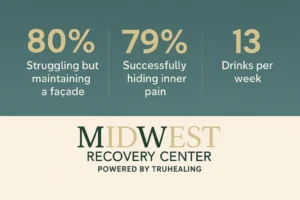On paper, I looked like I had it all together.
I was showing up to work on time. I was hitting deadlines, leading meetings, even getting compliments from my boss. My bills were paid, my home was clean, and my calendar was full. No one in my life—maybe not even me—would have used the word “addiction.”
But every night, the minute the door closed behind me, the mask came off.
I’d pour a drink, maybe two, just to “come down” from the day. Then maybe a third, just to fall asleep. Some nights, it was more. Some mornings, I’d lie to myself: I’m just stressed. Everyone drinks.
But deep down, I knew something wasn’t right. I wasn’t out of control in the traditional sense. I hadn’t lost my job, or crashed my car, or ruined my relationships. But I was losing something else—my peace. My joy. My grip on who I was underneath all the functioning.
Eventually, I reached a point I couldn’t ignore anymore. That’s how I found the Intensive Outpatient Program in Toledo, Ohio at Midwest Recovery Center. And it ended up being the hardest and best decision I’ve made.
Being “High-Functioning” Was My Greatest Hiding Place
For a long time, I believed as long as I was functioning, I was fine.
That belief kept me from seeking help for years. Because who was I to need treatment? I wasn’t waking up in alleyways. I wasn’t missing work. I was productive, successful, capable. I was winning—at least on the outside.
What I didn’t realize was that success had become my excuse.
I could rationalize every hangover. Every bottle of wine I finished alone. Every lie I told to avoid social events that didn’t involve drinking. If I was still getting things done, how bad could it really be?
It turns out, “high-functioning” just meant I was really good at hiding how bad I felt inside.
When You’re Exhausted But Still “Performing”
The thing no one tells you about high-functioning addiction is how exhausting it is.
Keeping up appearances while internally unraveling is its own kind of burnout. I was always “on.” Always managing, fixing, helping others—while quietly numbing myself behind closed doors.
I couldn’t tell anyone. Not my coworkers. Not my partner. Not even my closest friends. I was terrified of what they’d think if I said the words out loud:
I think I might have a problem with alcohol.
The turning point wasn’t a dramatic event. It was a quiet night. Me, in my kitchen, staring into a glass of whiskey and realizing I didn’t even want it—but I didn’t know how not to want it.
That’s when I started searching. Not for rehab. Just… options. Something that wouldn’t blow up my life. Something that met me where I was.
Finding an Intensive Outpatient Program That Worked for Me
When I found Midwest Recovery Center’s Intensive Outpatient Program in Toledo, it was like finally seeing a door crack open in a room I didn’t realize I was locked inside.
I didn’t need to quit my job or check into a facility full-time. I could attend sessions in the evenings, keep working, keep showing up—and still get real help. That mattered to me. My life didn’t need to stop for me to start healing.
IOP gave me the structure I desperately needed, with enough flexibility to preserve the parts of my life that still worked. That balance was everything.
And if you’re looking for an Intensive Outpatient Program in Maumee, Ohio or Perrysburg, Ohio, Midwest offers access to care without pulling you out of your daily responsibilities.

What Treatment Was Actually Like (Spoiler: Not What I Feared)
Walking into my first group session, I was nervous—and, frankly, skeptical.
I thought I’d feel out of place. Too buttoned-up. Too “functional.” I thought everyone would look at me like I didn’t belong.
But the truth is, I belonged there more than I knew.
The room was full of people just like me. Teachers. Nurses. Managers. Parents. People who looked composed but felt like they were falling apart on the inside. That realization alone lifted years of shame off my shoulders.
In IOP, I learned how to identify triggers I hadn’t even noticed. I learned how to pause before I reached for a drink. I started understanding the role alcohol played in my life—and how much it had started doing the thinking for me.
The therapists weren’t clinical robots. They were real. Compassionate. Honest. They didn’t just teach—they saw us.
The Emotional Work That Made the Biggest Difference
There’s something powerful about being able to say, “I’m not okay,” and have someone respond, “I hear you. Let’s figure it out together.”
I had to unlearn a lot:
- That vulnerability was weakness.
- That asking for help meant failure.
- That productivity was the same as health.
We talked about the things high-functioning people rarely get space to name: the pressure to hold it all together. The loneliness of being everyone else’s go-to person. The way drinking becomes a coping strategy for invisible pain.
For the first time, I didn’t have to perform. I just had to show up—and slowly, start being honest.
What Life Looks Like After IOP
I won’t pretend that everything is magically fixed.
But I no longer live in quiet dread.
I still have hard days. But I don’t drink to disappear anymore.
I sleep better. I focus more. I’m present. I laugh more often—and it’s real.
My relationships have shifted, too. Some faded away, others deepened. And the new ones? They’re built on truth, not masks.
Most importantly, I like the person I’m becoming. Not because they’re perfect—but because they’re real.
FAQs
Is an Intensive Outpatient Program really enough support?
Yes—for many people, it’s exactly the right level of care. IOP offers multiple sessions a week, both group and individual. It’s structured, focused, and deeply impactful without requiring full-time admission.
Will I be in a room with people very different from me?
Probably not as different as you think. Addiction doesn’t look one way. You’ll meet people from all walks of life—many of whom are also high-functioning and looking for healing, not judgment.
Do I have to stop working while in treatment?
No. That’s one of the biggest benefits of IOP. Sessions are scheduled around work or school. You can continue meeting your responsibilities while doing the work.
What if I’m not sure I “qualify” for treatment?
You don’t have to hit rock bottom to deserve help. If alcohol is interfering with your peace, your relationships, or your sense of self—that’s reason enough.
Is everything I share confidential?
Absolutely. Your privacy is protected. No one outside your treatment team will know unless you choose to tell them.
If You’re Holding It All Together But Feel Like You’re Falling Apart—You’re Not Alone
It took me a long time to ask for help. I thought doing so meant I’d lose everything. But what I really lost was the weight of pretending.
If you’re standing where I was—successful but struggling, seen but not known—know this: you don’t have to wait until it all comes crashing down.
Call (888) 657‑0858 or visit Midwest Recovery Center’s Intensive Outpatient Program in Toledo, Ohio to take your first real step forward. Not when it’s too late—but while you still can.
You don’t have to fall apart to get better. You just have to stop pretending you’re fine.


























